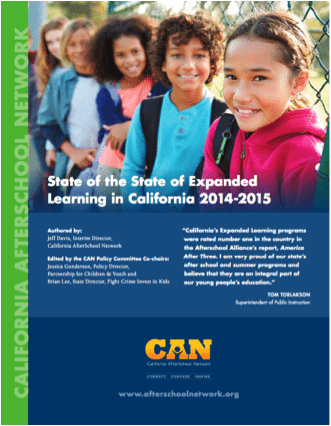You are after school, you are expanded learning, and your voice is more important than you know.
Youth voice is critical to the success of an after school expanded learning program. Seeking youth voice helps to develop caring relationships between staff and students, and increases the program’s relevance and meaning for youth participants. While practitioners consistently seek the voice of their youth and other stakeholders (parents, teachers and principals, partners) they often underestimate the importance of their own voice to ensure that high-quality programs are possible for the youth they serve. While it is true that advocates are hard at work advancing the after school and expanded learning movement, their voice will not make it very far without you.
It is your voice that will ensure that quality expanded learning opportunities are available to the youth and communities you serve.
 In March 2015, the Afterschool Alliance released America After 3pm, which summarized a national survey assessing participation, access, public support, and family satisfaction with after school programs. Based on their findings California (where I work) was ranked number one in the nation for after school. The report surfaced strong public support for after school in California, which demonstrate a strong return on investment. In May 2015, the California AfterSchool Network (CAN) released the State of the State of Expanded Learning in California.
In March 2015, the Afterschool Alliance released America After 3pm, which summarized a national survey assessing participation, access, public support, and family satisfaction with after school programs. Based on their findings California (where I work) was ranked number one in the nation for after school. The report surfaced strong public support for after school in California, which demonstrate a strong return on investment. In May 2015, the California AfterSchool Network (CAN) released the State of the State of Expanded Learning in California.
The State of the State surfaced that California has nearly 5,000 publicly funded expanded learning programs.
These programs serve nearly 500,000 of California’s highest need students on any given day.
The report surfaced that expanded learning opportunities are vital to closing the achievement and opportunity gap by increasing student achievement, engagement, and well-being outcomes for youth all year long. Despite strong outcomes, a significant return on investment, and strong public support, after school programs in California and the nation find themselves at risk.
While many states in the nation are envious of California’s expanded learning infrastructure, California’s programs are facing significant fiscal challenges. Increased cost pressures related to good policies such as increased minimum wage, the Affordable Care Act, and California laws mandating that employers offer sick time have all increased the cost of doing business. Expanded learning programs must adjust to these new cost pressures in the context of flat funding and a rising consumer price index. Expanded Learning programs are seeing the cost of doing business go up without any relief.
This year, an important conversation began in the California legislature.
Legislation was put forward by Senator Loni Hancock to increase per-student-per-day funding for expanded learning tied to the minimum wage and implement ongoing Cost of Living Adjustments (COLAs). Furthermore, the legislature recommended a funding increase in the budget sent to Governor Jerry Brown. Sadly, our Governor did not have the same foresight as California’s legislature and he did not approve a funding increase for expanded learning in the final budget.
Loni Hancock’s Senate Bill (SB 645), which had been amended to facilitate a smooth rollout of increased funds in the budget, was further amended to assist California’s programs in dealing with fiscal challenges by allowing programs the ability to implement furloughs. While this is not the ideal outcome, the conversation continues in our legislature. Now more than ever, we need the voice of the field to advance policies that will help the nation’s strongest after school infrastructure continue to be successful. Imagine what we could do together with the combined voices of the staff of close to 5,000 programs and all of the families and communities that benefit from them!
This is a big deal in California but we have even more to do nationally.
Recently the United States House and Senate have each put forward their plans to reauthorize the Elementary and Secondary Education Act commonly referred to as No Child Left Behind. Because of strong national advocacy, the Senate ultimately included the 21st Century Community Learning Centers (Federal expanded learning funding) in their version of the ESEA reauthorization. The more conservative House did not, opting instead to ELIMINATE THE 21st Century program in favor of a block grant for states that could be used for a variety of purposes including (if they chose) after school. In California that could mean a loss of close to 700 programs serving close to 100,000 youth.
There has never been a more important time for you to make your voice heard by your state leaders and federal Senators and Representatives. Advocates are working hard every day to ensure that these programs remain in tact and high quality, but they cannot do it without you. I hope you will choose to use resources like the America After 3pm report, the Expanding Minds Compendium of research on expanded learning, and resources like the State of the State of Expanded Learning in California to communicate the importance of these programs to your legislators and decision-makers. I hope you will attend your state advocacy days such as the California Afterschool Challenge and the national Afterschool Challenge.
I hope that you will host a Lights on Afterschool event at your site and invite your local, state, and federal representatives. I hope you will answer the call to the barrage of emails asking for a call to action. I hope you will discuss these issues with the families you serve and others who understand the value of expanded learning programs so that they can effectively raise their voice.
Your voice matters and it must be heard. The youth, families, and communities you serve every day depend on it.
For breakfast, I had granola cereal with lowfat milk.
Author Profile: @jeffdavis
